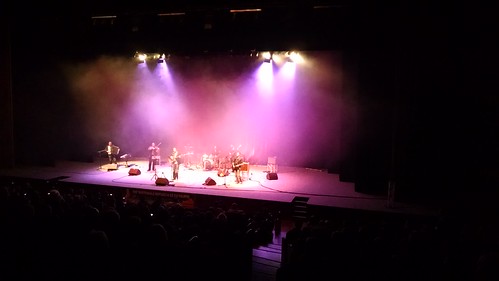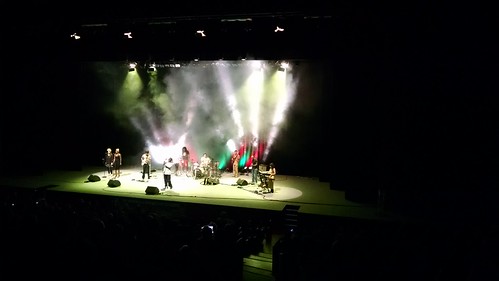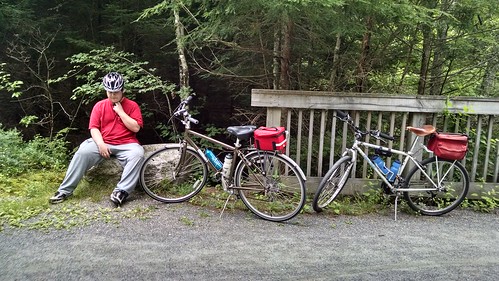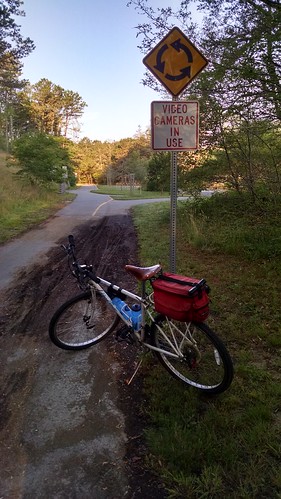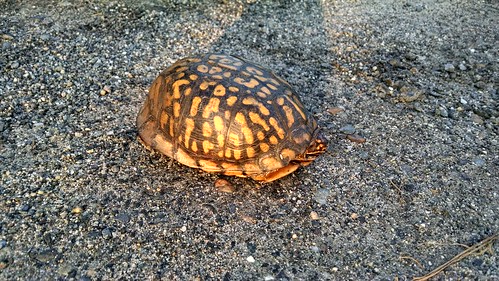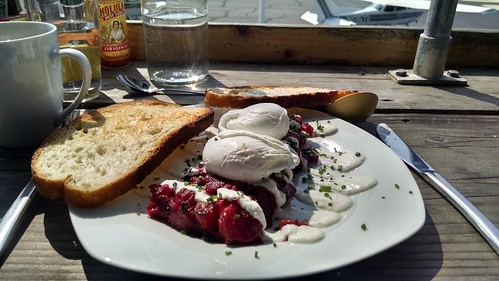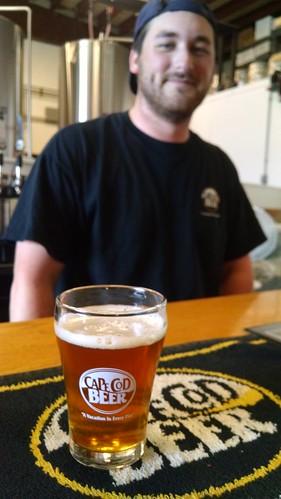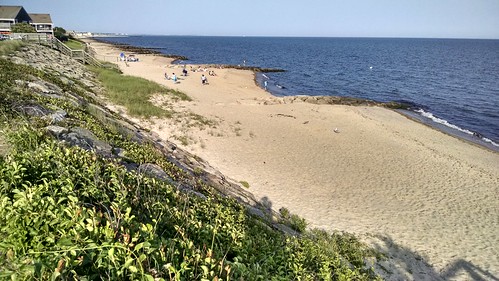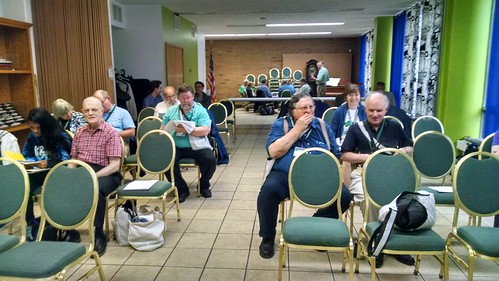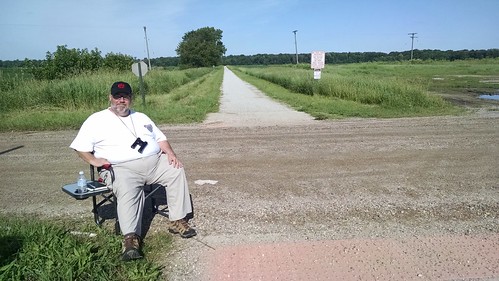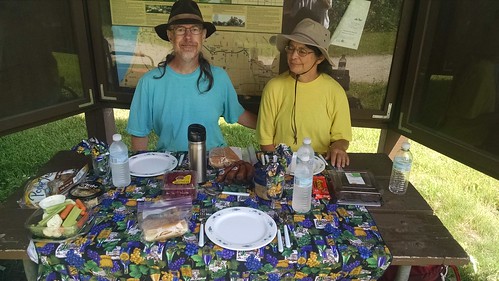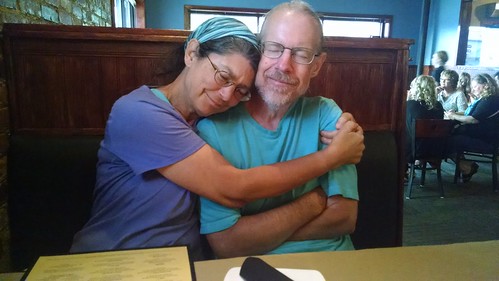For several years, I've wanted to attend the Universala Kongreso with Phil. We had both gone individually before: he went to the UK in Berlin in 1999 travelling to Germany with in-laws and I went to Copenhagen in 2011. Our life circumstances had conspired against travelling together: the closest UK-oj were in Cuba, where it was illegal for US citizens to go. In the earlier years, I was a new professor with young children. In later years, Phil was in constrained financial circumstances having retired when his work site closed before his pension started and during the collapse of the Market. But this year was special: the 100th Universala Kongreso and in France, which promised to be both a large and interesting event.
Phil arrived a day early to Amherst so we could leave and travel together to France. We spent a pleasant day with my family and our mom. We departed the next day around 1pm by bus from the UMass campus. The first leg of the bus journey took us to Springfield uneventfully, beyond the bus driver complaining that we were speaking too loudly -- we were at the very front of the bus. We continued uneventfully until we arrived at the South Station in Boston where the bus to the airport was late. For a half hour, we paced nervously and then began to seriously consider when to make alternate arrangements so as to not miss our flight, but eventually the bus arrived, delivered us to the airport, and left us even with enough time to quaff a beer and toast the completion of the first part of our journey.
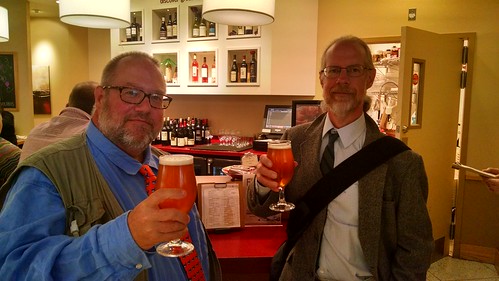
Our first flight to Reykjavik was pleasant. Icelandair has Boeing 757's that are pretty comfortable as modern airlines go. They didn't have tomato juice, however, which was a disappointment. But they did have interesting lighting. On the roof of the aircraft, blue, green, and yellow lights flickered, growing and dimming in intensity giving the effect of the aurora borealis.
I was surprised when we arrived in Reykjavik that we were not directed through passport control. We checked with the agent but travellers headed to Britain could fly on directly, rather than entering the EU in Iceland. We had a relatively short layover and just got a cup of overpriced coffee while we waited.
The flight to Britain was relatively short (less than 3 hours) but once we arrived, it felt like we had to walk the same distance to reach passport control. And there, we entered a kafkaesque line that went back and forth across a gigantic room 5 or 6 times. We shuffled back and forth seeing the same faces over and over again. Finally, we reached an agent who affected anger that we hadn't filled out the immigration form sufficiently: we had put neither a port of departure nor a local address. In the first case, I wasn't sure what "port of departure" meant: whether Reykjavik or Boston. In the second case, we didn't have a local address because we were leaving the same day. "What? The same day? Why? Why did you come here?" he demanded exasperatedly. We explained we were on route to Lille and wanted to go through the Chunnel. "For the scenery?" he snorted derisively. We nodded our heads vigorously. He looked like he'd never heard of such a hare-brained scheme, but stamped our passports and let us in.
After collecting our bags, we had another 3 hour walk to reach the Heathrow Express -- the train into central London. (It didn't actually take 3 hours, but it felt like it.) We followed the signs and found the train without difficulty and arrived in Paddington station. At that point, we weren't sure how to navigate to the Eurostar station in St. Pancras. But, more importantly, we had been travelling for something like 12 hours and needed beer. Luckily, there was a place called "The Beer House" close at hand. They had a beer on tap that looked pretty good, but the pretty barmaid said there was a problem with the refrigeration of those taps. The other options looked less interesting, but, on her recommendation, I selected a local pale ale and ordered Chicken Tikka Massala. Phil got the same.
Much refreshed, we found an information booth where a nice lady give us directions to find the right platform to take the tube to St. Pancras. We had to walk upstairs, past the taxi stand and then back down a lift to Platform 16. It was confusing -- in fact it began to seem like London was one big train station with different tracks, platforms, entrances, exits, lifts, and stairs going every which way. Purchasing the tickets was similarly tricky to navigate in the machine but, luckily, there was a not a long line of impatient people at the time we needed to travel and we had plenty of time, so it was not a problem to take as long as we needed.
We had several hours available to us at St. Pancras, so the first thing we did was walk through the entire station to see what was there. It was raining heavily outside, so there wasn't much point in trying to explore the surrounding area. The Eurostar documentation had warned us we needed to check in in advance, but it became clear you couldn't check in very much in advance -- they had a nice waiting room, but you could only get in about 45 minutes before your train. Eventually we got a pot (small) of coffee, as we were beginning to run down.
Finally, they let us in, we waited a bit more, and then boarded the train. We were seated near the middle of one of the last carriages in a backward-facing seat with forward facing seats opposing. The train headed out passing through many small tunnels before finally diving down under the Channel. Each time the train went into or out of a tunnel, there was a strong pressure wave that would make your ears pop. It was actually pretty uncomfortable. But the train was fast and smoother and it was interesting to see some of the British countryside and a good bit of the French countryside as the sun set. The train finally rolled into Lille around 10pm.
The last leg of our trip was to navigate in the dark through the streets of Lille with our rolling luggage. We had looked at the map ahead of time and set off looking for landmarks, but couldn't find anything we recognized. Phil had loaded a mapping application to his tablet that didn't require network and I had my actual, physical compass, and between the two tools, we figured out that we'd gotten turned around and had come out the wrong side of the station. With that key piece of knowledge, we got turned around and found our way first to the Kongresejo and then to our hotel. They were expecting us, we checked in, and, after quick showers to wash off the grime, we collapsed into our beds.
Our hotel room at the Hotel Ibis Styles Bellfroi was entirely satisfactory: two twin beds and a tiny bathroom. The only deficiency, from my standpoint, was that the sink was so close to the wall, I could barely squeeze between them to get to the toilet. But it was clean and well maintained with plenty of hot water.
We arose in good order and enjoyed our first breakfast. It included a sufficiently vast array of selections: croissant and chocolate croissant; two kinds of bread; ham and several kinds of cheese (a hard cheese, a stinky cheese, and packets of cream cheese); several types of cereal; and I think there were bagels and some kind of banana-bread or cake or something. For drinks, there was milk and two kinds juice (orange and probably apricot) -- and additionally a rube-goldbergesque machine that had a bin of oranges on top and would feed them in and squeeze them to produce fresh juice. There was also a Melita Cup machine for coffee which Phil found subptimal, but which made an acceptable cafe aŭ lait or cappuchino.
After the long travels, we couldn't quite remember the details of the schedule, so we reported early to the kongresejo to find out what was happening. We found it still closed, but met up with several new and old friends outside and chatted amiably until things got started. We registered without problem, got our badges, and found a table in the Kongresa Kafejo to peruse the kongreslibro and arrange our schedule.
I did not much like the kongresejo, the Lille Grand Palais. It was OK, but had weird architecture inside, with bizarre angles, strange lighting, and everthing antigogglin. The giant room Michaux was used as open space, but also had musical events and had the worst acoustics EVAR. The organizers also did not reserve a large enough venue for the plenary events, so hundreds and hundreds of participants had to watch the events via television from overflow rooms. It might have been understandable if this was simply the largest venue available but literally attached to the Lille Grand Palais is Le Zénith, which has a capacity of 7000.
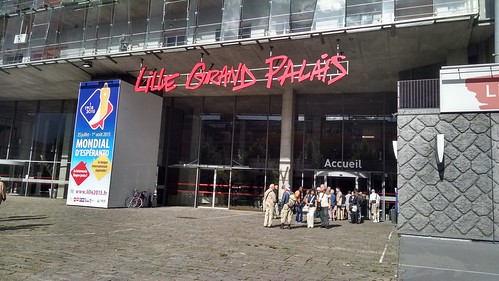
We spent the morning in the meeting of the "komitato" of UEA. The power structure in UEA is rather strange, to American sensibilities that wants to see division of powers. In my analysis, most of the power is currently held by the Director of the Central Office. There is a president and a board of directors that also have a lot of influence, but it was clear from many of the comments that they, in fact, exercise relatively little control over what the Director wants to do. Below them, is a large body, partly elected and partly appointed by the various national Esperanto organizations, based on the size of their membership, which seems largely powerless. They are requested to take various votes and can speak at the meetings, but largely are held at arm's length.
After the komitat-kunsido, we met up with Yoshito, a twitter friend from Japan, and went for our first lunch in France. We eventually found a little Tunisian restaurant and got, basically, sandwiches. Phil and Yoshito got kefta and I got kabob.
In general the food has been good. In later days, we went also to a Turkish restaurant where we got salads with tandoori chicken on them. We went to a Tex-Mex restaurant that was a bit out of the way — and expensive — because I'm always interested to see what Europeans do with Mexican food. (In Madrid and Copenhagen, my experiences were eye-opening). Here, it was just good Mexican food. Particularly notable was the Salade de la Brasseurs (or Brewer's Salad) which had, on a base of lettuce and greens, potatoes, green beans, plus, for a special treat, chicken livers and gizzards! (You can see for yourself on their menu. It was pretty good.
I got the Brewer's Salad at Tres Brasseurs, a microbrew near the train station -- just a few steps from both our hotel and the kongresejo. Lille is very close to Belgium and beer is a huge thing here. Unfortunately, they don't know what bitter beer is. Kalle and I both got "La palette de dégustation" which lets you try 4 small glasses of their beer. They were all odd and interesting, but none was really hoppy. I tried also Affligem, two beers from Pelforth, and the special beer brewed for the Kongress by lepers, but they were all kind of sickeningly sweet with almost no hoppy flavor. I got someone to help me ask in French "La pression plus amer, si vous plait!" We went to little dive nearby and and I tried out my French. The cute little waitress thought for a minute and then brought two bottles of Anosteké — an artisanal beer. It wasn't bad — it was *almost* bitter.
It was wonderful to reconnect with so many friends. I'm kind of amazed how many people I know in Esperantujo — from all over the world. I was particularly pleased to reconnect with Kalle Kniivila and Hirotaka Masaaki. Kalle was there only for a few days, in part, to speak about his recent books "Homoj de Putin" and "Krimeo estas Nia". Kalle is a journalist who specializes in the politics of Russia and Eastern Europe and won substantial prizes for the books in Sweden and Finland. But the same time they were released in Swedish and Finnish, he released them also in Esperanto. After his book presentation and signing, he signed the two copies he'd brought as examples for me. Hirotaka (or Vastalto in Esperantujo) helped me with my Esperanto books by checking my haiku manuscripts. He also wrote a very nice forward for my second book. We had interacted a lot online, but had never met in person. It was wonderful to finally meet him and to spend the day together on the excursion to Bulonjo ĉe Maro. But so many friends! Bergino, Bonulo, Maria, Normando, Bill, Lesek, both Jose Antonios, Istvan, Neil, and so many more. And many I had heard of, or interacted with on-line, but had never met in person. And of course, thousands more esperantists. The final number was nearly 2700 participants from more than 80 countries.
The Universala Kongreso starts on Saturday and runs to the following Saturday, but on Wednesday there are no events in the Kongresejo. There are a bunch of organized excursions, but many people simply use the time to explore the host city. At the other UK I attended, I was invited to travel to Sweden from Denmark to spend the day at Kalle's house with a bunch of other notable esperantists. This time, I signed up for the excursion to the ceremony at Bulonjo ĉe Maro honoring the first Universala Kongreso which happened there 110 years ago. I wrote up an article for Libera Folio about the excursion. It was great, although I would have enjoyed a bit more time to just take in the sights and atmosphere.
On the whole the congress exceeded my expectations, although a few things were disappointing. I was disappointed to find that the Libroservo hadn't brought any copies of my haiku books to sell. This was not really surprising to me although I joked, when Kalle said that his book had already sold out on Tuesday, that my books must have already sold out by Sunday when I first visited the Libroservo. I was also disappointed that only some of the participants were able to come to the key ceremonies (the opening, the closing, etc) in the main auditorium. They had provided tickets to attend these and it was only upon reaching the door that Phil discovered that he had signed up too late and had to watch those events on TV. :-/
When arriving at the Kongresejo one day, I saw a man from Angola (he was wearing a hat that said Angola and confirmed that he was from Angola) just outside the door with a suitcase on the ground with stuff for sale. There were watches with the logo of the Congress for 10 euros and t-shirts and other stuff. As we were arriving Ionel Onet (who runs the libroservo) was berating the fellow, telling him he didn't have the right to do that. He stood his ground and when I came back later, I asked if I could take his picture and spoke to him for a bit. I figure that what happens inside the kongresejo, UEA can control, but what happens outside is not really any of their business. When I tweeted about it, there was a reply from someone who respectfully disagreed with me. So I was pleased when, during the auction, none other than Humphrey Tonkin mentioned how, as a student, he had taken sweaters from Britain to Polland to sell on the black market and how that had paid for his trip. I was pleased to see he was still there throughout the congress.
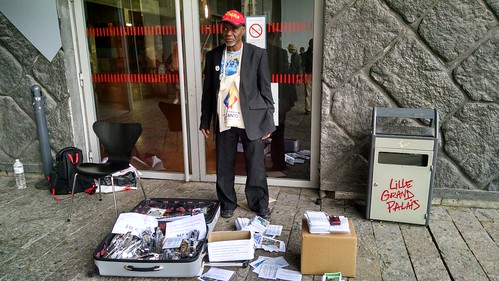
The auction too was fun. Humphrey always puts on a good show and tries to shame people who don't buy anything (most people, since there were several hundred people there and less than 100 items to buy.) He manages to make each item seem interesting. The most expensive item was an original letter by Zamenhof to the Arnhold family — an important banker in Germany at the time. It brought 1100 euros. Most of the items are old and unusual books. Of course most books in Esperanto could be considered "unusual" to begin with. Most go for 30-40 euros, but a few, with interesting inscriptions or particular uniquities, go for more -- sometimes hundreds.
There are a lot of beggars in Lille. No more than most large cities, I suppose. I didn't give money to any of them. One fellow walked past me later making an unpleasant noise. They didn't all appear to be of any particular ethnic group. At the same time, migrant refugees in Calais were causing delays of shipping through the Chunnel. When we went on the excursion to Boulogne, trucks were backed up what looked like a couple of miles trying to offload their containers. At one point, it was also delaying the Eurostar trains, although in the end it didn't affect us. We noticed razor wire on the fences around the Chunnel entrance on the French side. Not so, on the British side.
There were several outstanding musical performances. I blogged about two already -- and there were several I didn't see. I was particularly impressed by a band from Latvia composed of parents (playing keyboard and base) with their son playing guitar and violin. He was a real virtuoso and, overall, the performance was outstanding. I was looking forward to seeing Martin and the Talpoj. Unfortunately their performance was marred by technical difficulties -- the sound wasn't mixed properly and so the vocals were impossible to hear -- at least to hear well enough to understand. Phil was quite interested to note that the musicians all reverted instantly to English when trying to communicate with the technical staff. I observed that English was useful, but that Esperanto was more fun.
Originally, Phil and I had planned to travel back to England after the closing ceremony, spend the night in England, and then fly back the next day. I had put off looking for a room for no good reason but when I finally started looking, I couldn't find any suitable rooms and many places seemed to have a "minimum stay" requiring you to pay for at least two nights. I checked four or five places and, although there were obviously dozens or hundreds that might be suitable, eventually I just gave up and we arranged to stay another night in Lille and take the train back the next day. This gave us another afternoon and evening and enabled us to meet up with Bonulo and Bergino one last time before heading home. We had also gotten a note from a local guy in Lille who had studied Esperanto at one time, but had never actually met up with any esperantists before. He realized the congress was happening too late to get time off from work or participante. But he sent a note asking if anyone wanted to meet up with him, so we invited him to have dinner with us. We met at the fountain by the train station and offered to let him choose the restaurant. He pointed us toward "Holy Cow" -- a burger joint at the side of the station. It was just fine, as burger joints go. Afterward, we walked to a bar he knew. He and I got beer while the others got coffee or lemonade. He had learned Esperanto out of a general interest in Conlangs and was interested in talking about Volapük and Ido -- I remember when I had the same kind of outlook about Esperanto: thinking of it as a language project rather than a real, fully-fledged language with a diverse community of speakers. That kind of attitude doesn't generally survive actual contact with the Esperanto community. In any event, we had a nice time and it was great to spend a bit more time with Bonulo and Bergino.
I rather liked the ambiance in Lille. The architecture is beautiful with many interesting buildings. Many of the streets had bike lanes. There was a bike-rental system that looked to be reasonably priced, although I ended up not renting one. We had plenty to explore on foot and, although it would have been interesting to see more by bike, it would have taken away from spending time at the kongresejo.
The non-esperantist people we met were generally very helpful. As we were trying to walk back to Paddington, we took a wrong turn and ended up walking around two sides of the station where there were no entrances. I asked a beefy brit if he could help, "Sure, mate!" he said. And when I asked if he knew how to get into Paddington Station, he said, "Wot? Well, it's right here, innit?" and directed us to continue a bit farther where there was finally an entrance. In France, people were equally helpful, even though we knew little-or-no French. Many people spoke some English -- the attendants at the hotel were particularly fluent. But many people spoke very little English and we were reduced to pointing at things.
I had an interesting realization while we were in Boulogne: I realized that when they played the French national anthem, it was hard to take it seriously. Too many movies have used it as a punchline for a joke. I've realized recently that my brain is full of stuff I uncritically learned as a child from my environment that all needs to be brought out, considered, and rejected, including attitudes about race, gender, and other nationalities. I have to admit, however, that its kind of hard to take the French language seriously too. It sounds too contrived to be real: who in the world would really say things like that!
It's been particularly nice to spend time with Phil. As children, we were very close, but grew apart in middle-school and high-school. We reconnected after college and, when the internet happened, were both early users and kept in touch electronically daily -- or often more frequently. But circumstances have conspired such that we live rather far from one another. Travelling to the UK has been great fun and given us a lot of time to chat and discuss things in depth. We spoke basically only in Esperanto until after the congress was over. After the congress, we continued to speak in Esperanto when other people were around but, little by little, switched back to English.
We knew our travel arrangements were overly complicated, but everything worked as expected: walk to station, train to London, walk to Paddington, Heathrow Express to airport, flight to Iceland, 10 hour layover :-(, flight to Boston, bus to South Station, bus to Springfield, bus to UMass, car-ride home. We arrived home exhausted, but in good order. Still, I think that next time, I'll aim for greater simplicity when travelling.
I'm not sure I will need to attend another Universala Kongreso. I was glad to see all my friends and to experience a really big UK -- and to participate in the touching ceremony at Boulogne sur Mer. But it's such a long and expensive trip. But, Phil and I agreed that if we're both still around, we'd be definitely up for the 200th…




